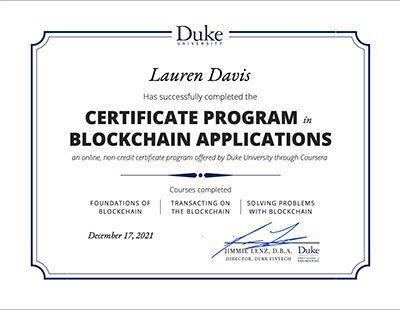Jimmie Lenz on Why an NFT Makes for a More Secure, Versatile Diploma

Students who complete a series of Duke engineering courses via the Coursera online learning platform will receive a copy of their certificate as a Non-Fungible Token – or NFT. The course instructor says this is likely to be the future of education certification.
The unique digital token comes at the completion of a sequence of courses on blockchain technology taught by Jimmie Lenz, who directs the Master of Engineering in Financial Technology and Master of Engineering Cybersecurity programs at the Pratt School of Engineering, where he is an executive in residence.
A scholar of financial tech, capital markets and banking, Lenz spoke to Duke Today about the NFTs and what the future looks like for this sort of technology.
Here are excerpts:
Q: Students in your blockchain technology class on Coursera receive their certificates as an NFT – a Non-Fungible Token. How is this better than a traditional paper certificate, and what, if any, limitations come with the paperwork in this form?
LENZ: Consider a paper diploma, can you use it to show an employer that you’ve actually graduated from an institution? Probably not, after all anyone can make a good copy of a paper diploma, right? How does an employer know if it’s legitimate? What usually happens is that you have to pay for an official copy from a college registrar, and this is only valid for about a month.
An NFT, on the other hand, can’t be changed; it’s “non fungible” or unique. It’s very easy to verify because an employer can just go online and see that an NFT was sent from the school’s wallet address to the address of the applicant. It can contain certain metadata that provides additional details too. There are few limitations to what can be embedded on an NFT.
 Q: Is the key benefit here portability, security, both, or something else entirely?
Q: Is the key benefit here portability, security, both, or something else entirely?
LENZ: The security aspect is extremely important for all involved. After the stories came out about the Coursera course NFT’s, I was overwhelmed with stories from employers about diploma and experience fraud, which is very real and costly.
Q: How is this different than a simple scanned image of a paper document?
LENZ: These NFTs are unique. The code was altered so that they can’t even be transferred from the original wallet they are delivered to. Making them non-transferable is just another element of security. The other element is the metadata I mentioned previously; what if schools, after a student gave permission, embedded the NFT with every class taken? This way an employer not only knows that you received a certain degree, but also the courses taken. Obviously, that’s a huge difference from a paper diploma.
And one other important thing here, what do most people do with a diploma? Frame it and hang it right? With an NFT you could embed it into your LinkedIn profile or other social media. Try doing that with a pdf.
Q: Do you sense an appetite or demand for this sort of technology from companies, universities or other institutions that students completing your course might share the certificate with? If you’re an employer, for example, what is the benefit?
LENZ: I have heard from all three of these, students, employers, and schools. Students were ecstatic about receiving the NFTs; it was a complete surprise they didn’t know was coming until I told them to check their wallets. Next was employers; they asked for NFTs that carried diplomas and certificates, but also work experience -- basically a replacement for a CV, to try to cut down on exaggerated or fraudulent information.
Q: You wrote an essay about this topic in which you argue that universities can explore this world of digital diplomas an NFTs as a way to engage alumni networks. Do you think college graduates will have an expectation before long that documentation like this from their alma maters will come in this form? And how else might a university use this technology to engage with its students and graduates?
LENZ: I absolutely do. You’ve seen how NFT’s have exploded in popularity, and we haven’t really scratched the surface of the utility here. It will only take a few schools adopting it before employers start requesting these.
But this is also an opportunity to stay connected with students and alumni. Unlike your school email, which many schools turn off after a year (I have no idea why they would do this), a wallet address id permanent. Schools could use this for all types of engagement. From alumni events to fundraising, this really has few limits. How cool would it have been to send an NFT with a final message from Coach K to all alums with a short video embedded, for example?
Blockchain technology has already changed the world. As the technology proliferates not everything will prove out, but some things will become second nature, like the internet or cell phones. You can pioneer the adoption, or you can be dragged along, but in either case adoption will occur.